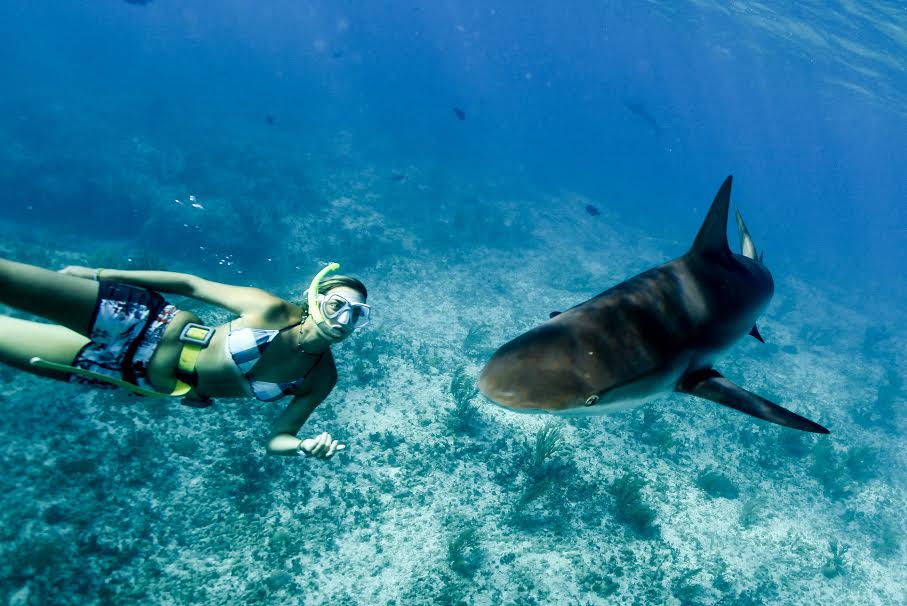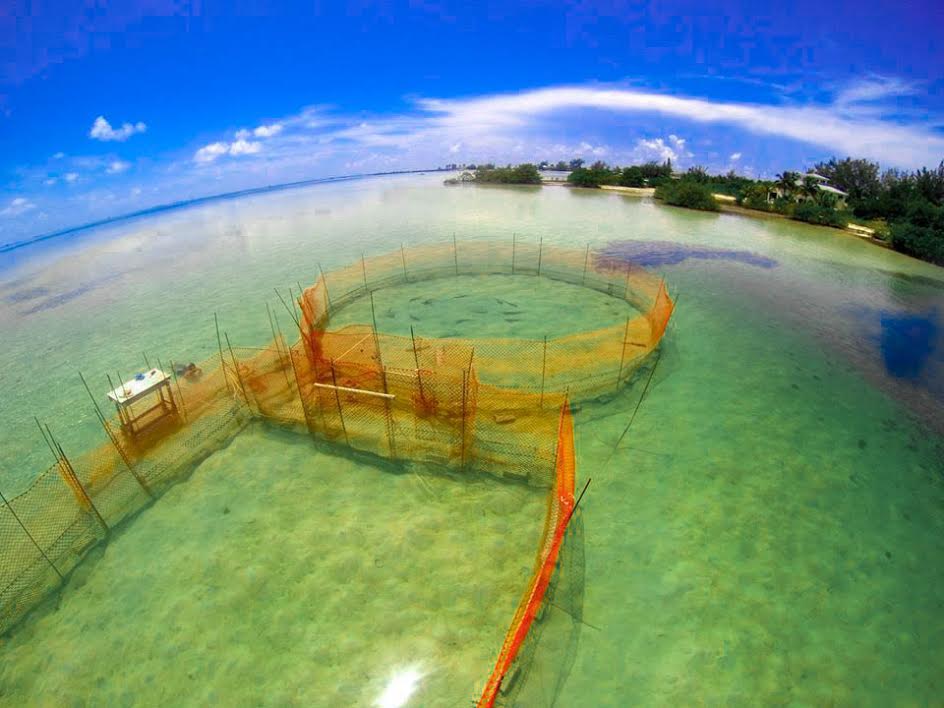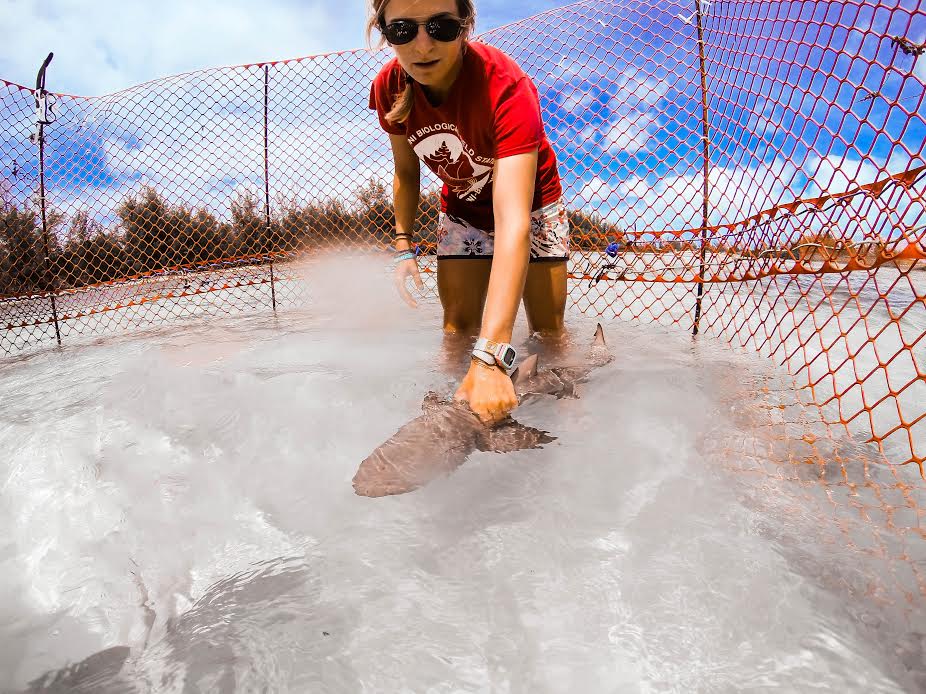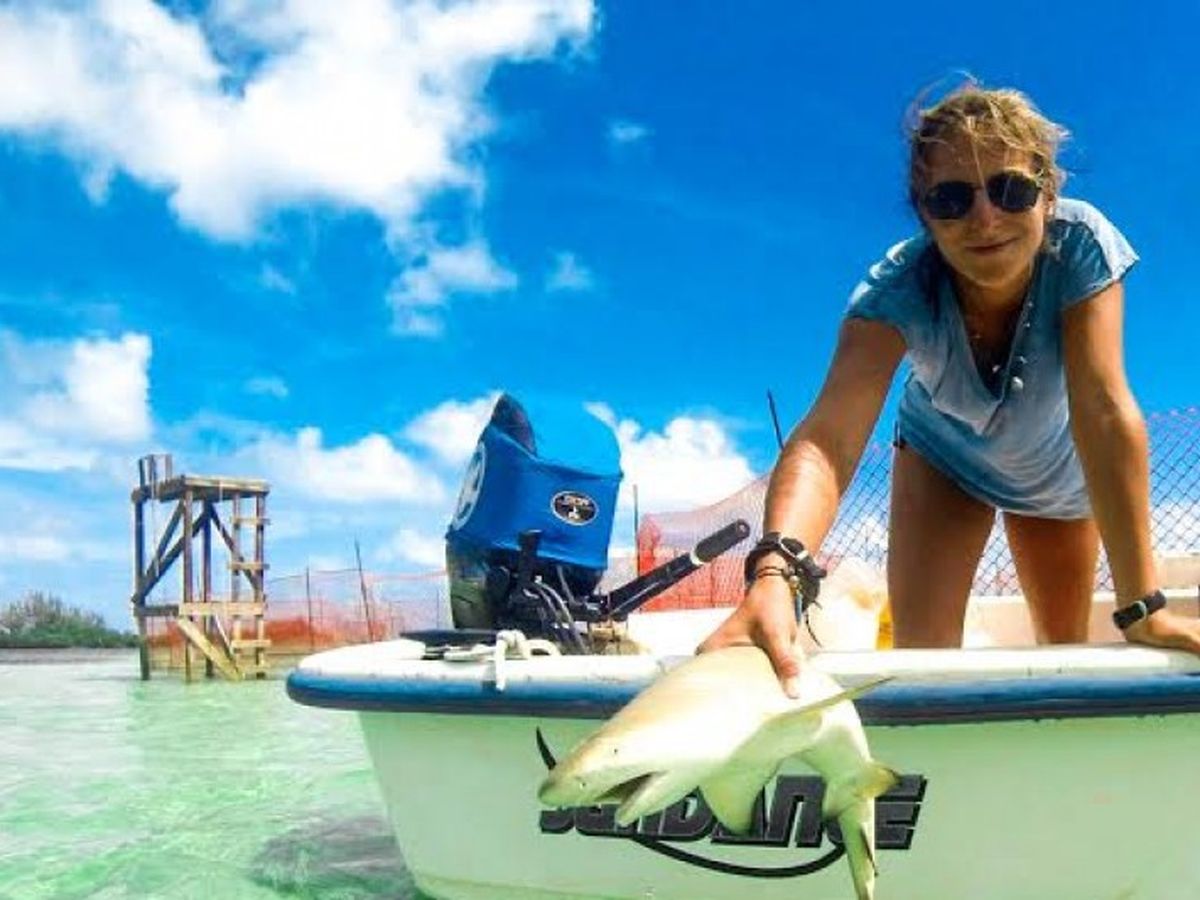- C
- k
Many people want to go to Australia for the Sydney Opera House, for the Great Barrier Reef, for the kangaroos… My dream trip is much different: I want to travel to Australia to present my work on lemon shark’s personalities at an animal behaviour conference. Since I work for a non-profit organization I am going to need your help to achieve my goal. I have until the 5th of July to gather 3500 euros! There won’t be any comfortable hotel rooms and dinners out for me, I calculated a budget plan only for what’s really necessary. Help me travel to Australia to present my work! Find out more about me and about the project below (Just after the paragraph in French) and for those who are already tempted to help, go ahead, the website will take donations in any currency and you won’t get charged any extra.
Pour beaucoup d’entre nous, Australie rime avec soleil, farniente, kangourous et vacances. Pour moi, un voyage en Australie représente une opportunité unique : celle de présenter mon travail sur la personnalité des requins lors d’une conférence sur le comportement animal ! Comme je travaille bénévolement j’ai besoin de votre soutien pour atteindre 3500 euros avant le 5 Juillet et confirmer ma présence à cette conférence. Pas de chambre d’hôtel luxueuse ni de diners au restaurant pour moi, je n’ai inclus dans mon budget que le nécessaire. Aidez-moi à partir en Australie pour parler « requins » ! Pour les curieux, vous trouverez plus d’informations à mon sujet ou à propos du projet un peu plus bas (après la partie en anglais). Pour ceux qui sont tentés d’aider, allez-y, le site internet accepte les donations en toutes les devises et le paiement est sécurisé !
WHO AM I?
Hi everyone! My name is Félicie and I am currently conducting my PhD research at the Bimini Biological Field Station Foundation aka “Sharklab ” on shark’s personality. Born and raised in the north of France, I spent my childhood riding horses, raising ducklings in my bed, breeding frogs, training pigeons, and following bees to see where they live… It is no coincidence that I found myself pursuing a career in animal behaviour. When looking for a field to get involved in, I decided to focus on something that was meaningful to me. Inspired by the Commandant Cousteau’s adventures, I went to attend a conference given by his expedition master and scientific advisor, François Sarano, in Paris. His words made the choice for me: “By meeting crocodiles and sharks, all the unloved of the sea, we understood that they were not the monsters but that a future without them would be monstrous”. I applied to the Bimini Sharklab for my masters in spite of having little experience in the marine world. I was inspired to study and understand the behaviour of these “monsters of the sea”. Doing my masters with these wonderful animals was like taking a first bite out of my favourite cake: I could not stop, I had to take a second bite; so here I am doing my PhD research trying to understand their personality in the wild!

WHAT IS THE PROJECT?
I am honoured to have been selected amongst 850 candidates to present my research at “Behaviour2015 ”. This year, the conference will take place in Cairns (Australia) and it is quite a trip to make from the Bahamas. I have already had the opportunity to present my work at European Elasmobrach Association (EEA) meeting in the Netherlands last November. Presenting at the Behaviour2015 will allow me to reach out the animal behaviour network of scientists.
Although the Sharklab supports my research, they cannot afford to provide me with a salary or funding for my trips to conferences. My journey to Australia will therefore entirely depend on your generosity.
WHAT WILL I TALK ABOUT?
The research that I will present was conducted in 2013 on juvenile lemon sharks (Negaprion brevirostris). My objective was to find out if sharks’ personalities affect the ways they explore and learn about new environments.
Twenty-eight juvenile lemon sharks were introduced and observed in a rectangular pen divided in 18 sections: The number of sections visited within 10 minutes was found to be a relevant indicator of the shark’s personality. The experiment was repeated 6 times for each shark in order to see how their activity changed with the pen becoming more and more familiar. Sharks were found to have different habituation rates and to learn about their spatial environment at a different pace according to their personality!
Don’t worry about the sharks’ welfare! All the sharks were kept in what we call “semi-captive pens” directly in their nursery area. These pens are made of thick meshing that allows water to flow through them and doesn’t exclude the sharks from their natural environment. They were built directly in the sharks’ habitat to ensure that they were not stressed by conditions drastically different from the ones they know. If a shark escapes, it can find its way home easily. Finally all the sharks were fed to satiation every two days and were released less than 4 weeks after their capture.

WHAT WILL YOUR DONATION PAY FOR?
- 500$ of accommodation for 9 days in Cairns. I will be staying in a dorm in a hostel very close to the conference center!
- 2300$ for the flight from Bimini to Cairns. 48 hours of travel, I am going almost around the globe!
- 400$ of registration fees.
- 300$ for travel insurance and food
- TOTAL: $3500
WHY IS IT IMPORTANT?
With a quarter of shark and ray species of the world threatened with extinction it has become urgent to increase our understanding of these animals. Increasing our knowledge of these species and our understanding of their personality will help to improve their management and conservation. Like any top predator, sharks ensure the balance of all the lower trophic levels in the oceans. The slow extinction of sharks is leading to an ecological disaster in many ecosystems.
In behavioural science, personality study has become increasingly important through the years, however, very little attention has been given to sharks. With my research being one of the pioneer projects on shark personality, it is crucial to share my findings and knowledge with the animal behaviour and shark communities.
The “Behaviour2015” conference will host a number of very influential scientists from all fields of animal behaviour and expertise. I will be one of the only representatives from the shark community. I am hoping to share my preliminary results with professionals in personality study and receive some constructive criticism as well as emphasize the use of sharks for animal behaviour studies.
WHY SHOULD YOU CARE?
Sharks are a widely misunderstood species. A majority of the general public sees sharks as mindless man-eating machines; I have come to know them differently. After spending, a year of my life observing their personality, I have gained an immense amount of respect for these misunderstood creatures. By sharing my knowledge and understanding of sharks’ personality, I hope to inspire scientists from around the world to study shark personality and hopefully make better decisions about shark management and conservation around the world.

WHAT IF I DON’T REACH MY GOAL?
Unfortunately, if I don’t reach my goal, I will have to cancel my trip to Australia. However, all of your donations will not be wasted. The Bimini Biological Field Station is a non-profit organization; therefore upgrading our scientific equipment is always a struggle. All of your generous donations will be used by the lab to purchase acoustic telemetry equipment for shark tracking. The Sharklab’s tracking equipment is limited and also getting worn out in the harsh environment. We are always looking for funding to deploy more tags and develop our shark movement database.
My PhD project involves the use of acoustic telemetry methods, where sharks are followed in the wild thanks to transmitter tags and receiver stations. My goal is to find out if, according to their different personalities, sharks differ in their use of the habitat and movement patterns.
Depending on the level of donation, we will purchase:
- Up to ten transmitters (195$ each)
- Up to three new active tracking hydrophones, which will allow us to follow a shark in “real-time” (675$ each)
- One submersible ultrasonic receiver, which will record the sharks’ movement within its range even when I’m not in the field. Great for when I can’t make it out in the field! (1275$)
- One active tracking transmitter receiver to replace one of our old ones. Check out the lab’s most epic shark tracking !
WHAT IF I GET MORE THAN EXPECTED?
Extra funds will go towards enhancing my trip to Australia and hopefully allowing me to get in the water with sharks of the Great Barrier Reef. If I receive a significant amount more, the money will go towards the acoustic telemetry equipment cited above and other equipment for my project.
Bimini sits in a unique location, abundant with more than 10 shark species, as well as a nursery grounds for lemon sharks and possibly other species. The possibilities for shark research are endless, and no donation will go wasted or unused. I also promise to keep in touch with everyone who donates to let you know how the conference goes and update you on my research (Don’t hesitate to follow me on twitter: @FelicieDh).
Thanks a lot!
QUI SUIS-JE ?
Salut à tous ! Je m’appelle Félicie et je suis chercheuse au Bimini Biological Field Station Foundation aussi appelé « Sharklab ». J’étudie la personnalité des jeunes requins citron qui vivent autour de l’île de Bimini aux Bahamas. Elevée dans le ch’nord j’ai passé le plus clair de mon enfance à cheval. Et quand je n’étais pas à cheval j’élevais des têtards ou des canetons dans ma chambre, je créais des centres d’entrainement pour pigeons et je suivais des bourdons pour trouver leurs maisons. Quand il a fallu choisir mon avenir, ma voie s’est tracée toute seule: ce que j’aimais c’était le comportement animal, je ne savais juste pas quel animal étudier ! C’est lors d’une conférence donnée par Paris par François Sarano (l’ancien chef d’expédition et conseiller scientifique du commandant Cousteau) que j’ai pris ma décision. « En allant à la rencontre des crocodiles et des requins, de tous les mal-aimés de la mer, nous avons compris que ce n'était pas eux les monstres, mais que l'avenir sans eux pourrait être monstrueux. ». En dépit de peu d’expérience dans le milieu marin j’ai postulé au Sharklab pour mon mémoire de fin d’études dans l’idée d’étudier le comportement de ces « monstres de la mer ». Une fois mon mémoire terminé je n’avais qu’une idée en tête : y retourner ! Et me voilà maintenant doctorante au Sharklab étudiant la personnalité des requins !

QUEL EST LE PROJET ?
J’ai l’honneur d’avoir été sélectionnée parmi 850 candidats pour présenter mon travail à la conférence « Behaviour 2015 » qui aura lieu à Cairns (en Australie) en Août. J’ai eu l’occasion en Novembre dernier de parler de mon projet à la conférence de L’European Elasmobranch Association (EEA) et donc de faire face à un publique de professionnels des requins ; cette fois ci, j’espère pouvoir recueillir l’avis de professionnels de l’étude du comportement animal.
Le Sharklab a la générosité de financer mes recherches, en revanche, ils n’ont pas les moyens de me fournir un salaire ni de financer mes déplacements pour participer à des conférences. Mon voyage dépend donc uniquement de vos dons.
DE QUOI VAIS-JE PARLER ?
Le projet de recherche que je vais présenter a été mené en 2013 sur des requins citron juvéniles. L’objectif était de voir si la personnalité chez les requins influençait la façon dont ils exploraient et s’habituaient à leur environnement.
28 jeunes requins ont été introduits et observés dans un enclos rectangulaire qui leur était inconnu. L’enclos était divisé en 18 zones et nous avons trouvé que le nombre de zones visitées par le requin en l’espace de 10 minutes était un indicateur de leur personnalité. L’expérience était répétée 6 fois pour chaque requin pour voir comment leur activité variait quand l’enclos devenait de moins en moins « nouveau » pour eux. Nous avons trouvé que les requins s’habituaient de façon différente en fonction de leur personnalité !
Pas d’inquiétude pour les requins ! Leurs enclos étaient construits directement dans leur nurserie pour ne pas changer leur environnement et pour leur permettre de rentrer chez eux facilement s’ils s’échappaient. Ils étaient nourris à satiété tous les deux jours et ont été relâchés en bonne santé moins d’un mois après leur capture.
POURQUOI EST-CE IMPORTANT ?
Avec plus d’un quart des espèces de requins et raies dans le monde menacées d’extinction, il est devenu urgent de mieux comprendre ces animaux. Comme tous prédateurs situés en haut de la chaine alimentaire, les requins assurent l’équilibre de leur écosystème. Leur extinction à petit feu nous mène vers un désastre écologique qu’il est toujours possible d’éviter.
Dans l’étude du comportement animal, la personnalité est devenue un sujet de plus en plus important, mais les requins ont pour l’instant suscité très peu d’intérêt. Pourtant, en en apprenant plus sur leur personnalité il serait possible d’améliorer nos stratégies de conservation des populations. Mon projet de recherche est l’un des pionniers dans ce domaine, il est donc crucial pour moi de partager mes résultats avec la communauté scientifique.
La conférence “Behaviour2015” me donnera l’opportunité unique de recevoir les conseils de scientifiques spécialisés dans le domaine du comportement animal mais aussi de mettre en évidence la viabilité des requins comme modèle d’étude.
Les requins sont vus par la plupart des gens comme des tueurs froids, des mangeurs d’hommes etc. Sentiment accentué par les drames répétés à la Réunion ces dernières années. Pourtant, au travers de mon travail j’ai appris à connaitre cet animal jugé « redoutable » sous un autre angle. La compréhension du comportement de ce seigneur de la mer est, de mon point de vue, une solution qui pourrait nous permettre de résoudre bien des problèmes sans passer par la case « destruction de l’écosystème ». J’espère donc, au travers de cette conférence, pouvoir partager mon expérience et inspirer des scientifiques du monde pour dans le futur prendre de meilleures décisions pour la conservation de l’écosystème.
QUE FINANCENT VOS DONS ?
Mon budget pour la conférence comprend :
- 500€ de logement pour 9 jours à Cairns. Je logerai dans un backpacker très proche du centre de conférence pour ne pas avoir à payer de transports en communs.
-2300€ de billet d’avion. J’en ai pour 48h de voyage! C’est presque un tour du monde!
-400€ d’inscription à la conférence.
-300€ pour mon assurance et potentiellement quelque repas.
Pour un total de 3500€ !

QUE SE PASSE-T-IL SI JE N’ATTEINS PAS MON OBJECTIF ?
Malheureusement, si je n’atteins pas mon objectif de 3500€ je serai dans l’obligation d’annuler ma participation à la conférence. En revanche vos généreux dons ne seront pas gaspillés. Le Bimini Biological Field Station fonctionne essentiellement sur des dons, il est donc très difficile de renouveler notre équipement scientifique.
Les dons seront donc utilisés pour acheter de l’équipement de tracking neuf. Lors de mon projet de thèse j’ai l’intention d’utiliser cet équipement pour pouvoir suivre des requins en temps réel. L’objectif est de voir si les traits de personnalité que je trouve en captivité se traduisent par des différences dans la nature : Par exemple, si un requin plus aventureux en captivité explore plus dans le milieu naturel etc.
En fonction du niveau de dons atteint, nous achèterons :
- Jusqu’à 10 transmetteurs acoustiques (195$ pièce). Implanté dans le requin ou attaché à sa nageoire dorsale, un transmetteur émet un son qui permet de suivre le requin partout où il va.
- Jusqu’à 3 nouveaux hydrophones qui (couplés à une station d’écoute) permettent d’écouter le son émit par un transmetteur sous l’eau. (675$ Chacun)
- Une station d’écoute submersible. Qui enregistre les requins qui passent dans sa zone d’écoute 24h sur 24 ! Très utile si je n’ai pas le temps d’aller sur le terrain moi-même. (1275$)
- Une station d’écoute mobile qui (couplée à un hydrophone) permet de suivre très précisément le requin en temps réel. (2100$)
Pour en savoir un peu plus sur cette méthode n’hésitez pas à regarder la plus récente vidéo de tracking d’un grand requin marteau par le Sharklab. (https://www.youtube.com/watch?v=Y6di4FBCVrQ)
ET SI JE DEPASSE MON OBJECTIF ?
Des financements supplémentaires me permettraient peut être de me mettre à l’eau avec de nouveaux requins sur la grande barrière de corail. Ou même de rendre mon voyage un petit peu plus confortable. Cependant, si les donations sont conséquentes tout l’argent supplémentaire servira à acheter l’équipement décrit plus haut !
L’île de Bimini est un lieu unique, on y trouve plus de 10 espèces de requins et les possibilités pour la recherche sont infinies. Aucune donation ne sera inutilisée, ou dépensée inutilement : la science sera prioritaire. Je resterai en contact avec vous tous pour vous raconter mon voyage et vous tenir au courant de l’avancée de mes recherches via e-mail, via ce site internet ou bien sur twitter (@FelicieDh).
Merci beaucoup et à bientôt !

